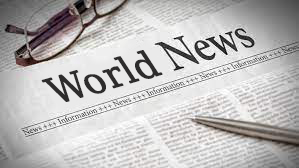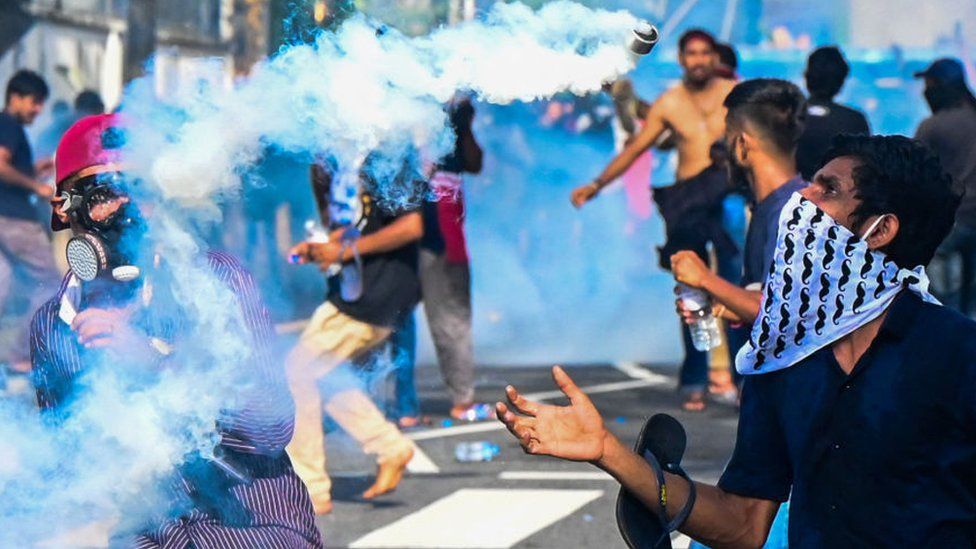



It comes after a 30-day grace period to come up with $78m (£63m) of unpaid debt interest payments expired on Wednesday.
The governor of the South Asian nation's central bank said the country was now in a "pre-emptive default".
Later on Thursday, two of the world's biggest credit rating agencies also said Sri Lanka had defaulted.
Defaults happen when governments are unable to meet some or all of their debt payments to creditors.
It can damage a country's reputation with investors, making it harder to borrow the money it needs on international markets, which can further harm confidence in its currency and economy.
Asked on Thursday whether the country was now in default, central bank governor P Nandalal Weerasinghe said: "Our position is very clear, we said that until they come to the restructure [of our debts], we will not be able to pay. So that's what you call pre-emptive default.
"There can be technical definitions... from their side they can consider it a default. Our position is very clear, until there is a debt restructure, we cannot repay," he added.
Sri Lanka is seeking to restructure debts of more than $50bn it owes to foreign creditors, to make it more manageable to repay.
The country's economy has been hit hard by the pandemic, rising energy prices, and populist tax cuts. A chronic shortage of foreign currency and soaring inflation had led to a severe shortage of medicines, fuel and other essentials.
In recent weeks, there have been large, sometimes violent, protests against President Gotabaya Rajapaksa and his family due to the growing crisis.
The country has already started talks with the International Monetary Fund (IMF) over a bailout and needs to renegotiate its debt agreements with creditors.
Later on Thursday, an IMF spokesman said the current set of talks on a potential loan programmeare expected to conclude on Tuesday.
Sri Lanka'sgovernment has said previously that it needs as much as $4bn this year.
Mr Weerasinghe also warned that Sri Lanka's already very high rate of inflation was likely to rise further.
"Inflation obviously is around 30%. It will go even [higher], headline inflation will go around 40% in the next couple of months," he said.
He was speaking after Sri Lanka's central bank held its two key interest rates steady following a seven percentage points rise at its last meeting.
The country's main lending rate remained at 14.5%, while the deposit rate was kept at 13.5%.
On Thursday, ratings agency Moody's Investors Service said Sri Lanka had "defaulted on its international bonds for the first time".
Moody's said it expects the country to eventually reach an agreement over an IMF bailout.
"However, finalising the programme will likely take several months given the need for staff level agreement on both sides, followed by parliamentary approval in Sri Lanka and approval by the IMF's executive board," the firm added.
Also on Thursday, Fitch Ratings lowered its assessment of Sri Lanka to a "restricted default" after a grace period for payments had expired.
S&P Global Ratings did not immediately respond to a request for comment from the BBC.
Credit ratings are intended to help investors understand the level of risk they face when buying a financial instrument, in this case a country's debt - or sovereign bond.
Last month, S&P and Fitch credit rating agencies warned Sri Lanka was about to default on its debts.
Last week, President Rajapaksa's elder brother Mahinda resigned as prime minister after government supporters clashed with protesters. Nine people died and more than 300 were wounded in the violence.
On Friday, Sri Lanka's new Prime Minister Ranil Wickremesinghe told the BBC that the economic crisis was "going to get worse before it gets better".
He also pledged to ensure families would get three meals a day.
Appealing to the world for more financial help, he said "there won't be a hunger crisis, we will find food".
-- Courtesy of BBC News